The residential electric underfloor heating market is projected to rise from USD 1.8 billion in 2025 to USD 2.8 billion by 2035, with a CAGR of 4.5%. The market growth curve shape indicates steady, incremental progress, with values moving from 1.8 billion in 2025 to 2.0 billion in 2028 and 2.2 billion by 2030. This gradual increase reflects the growing preference for energy-efficient and space-saving heating solutions in residential buildings. Analysts suggest that the curve points to an ongoing, stable adoption, as homeowners continue to seek comfort, reliability, and minimal maintenance in their heating systems.
By 2031, the market is expected to reach 2.3 billion, advancing to 2.6 billion in 2033 and closing at 2.8 billion in 2035. The shape of the curve highlights a steady but measured expansion, with continuous uptake driven by new housing developments and retrofit projects. The pattern confirms residential electric underfloor heating systems as an enduring solution for modern homes, offering consistent value and reliable performance with a clear trajectory toward broader acceptance.
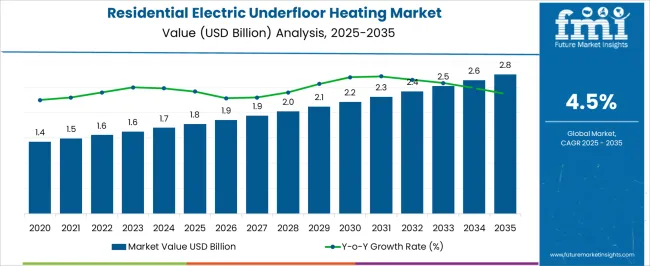
| Metric | Value |
|---|---|
| Residential Electric Underfloor Heating Market Estimated Value in (2025 E) | USD 1.8 billion |
| Residential Electric Underfloor Heating Market Forecast Value in (2035 F) | USD 2.8 billion |
| Forecast CAGR (2025 to 2035) | 4.5% |
The residential electric underfloor heating segment is estimated to contribute nearly 22% of the electric heating systems market, about 18% of the residential heating equipment market, close to 14% of the floor heating market, nearly 10% of the home energy management systems market, and around 7% of the building and construction materials market. Collectively, this results in an aggregated share of approximately 71% across its parent categories. This proportion highlights the growing demand for electric underfloor heating in residential spaces, where comfort, energy efficiency, and ease of installation are key considerations. Analysts view this segment as a crucial part of modern home heating solutions, where traditional heating methods are being replaced by more efficient, space-saving technologies.
The demand has been driven by an increasing preference for aesthetically pleasing and evenly distributed heating systems in homes, especially in colder climates. Residential electric underfloor heating is regarded as more than just a luxury; it is seen as a reliable, cost-effective solution that provides consistent warmth without the need for bulky radiators. The integration of electric underfloor heating systems into new builds and renovation projects reflects a shift toward energy-efficient, modern home solutions that align with consumer expectations. As such, the residential electric underfloor heating market is viewed as an integral component of the broader home heating and construction landscape, ensuring long-term value and comfort for homeowners.
Growing consumer awareness of the benefits of electric underfloor heating, such as even heat distribution and low maintenance requirements, is supporting market penetration across both developed and emerging economies.
Advancements in heating cable and mat technologies, alongside the integration of smart thermostats and home automation systems, are enhancing operational efficiency and user convenience. Regulatory measures promoting the use of energy-efficient building systems are encouraging adoption, particularly in regions with cold climates and high heating demands.
The ability of electric underfloor heating to provide space-saving solutions without compromising interior design is further increasing its appeal among homeowners and property developers. As construction activities expand and renovation projects rise, the market is expected to witness sustained growth, underpinned by technological innovations and favorable policy support.
The residential electric underfloor heating market is segmented by facility, application, and geographic regions. By facility, residential electric underfloor heating market is divided into new buildings and retrofit. In terms of application, residential electric underfloor heating market is classified into single family and multi family. Regionally, the residential electric underfloor heating industry is classified into North America, Latin America, Western Europe, Eastern Europe, Balkan & Baltic Countries, Russia & Belarus, Central Asia, East Asia, South Asia & Pacific, and the Middle East & Africa.
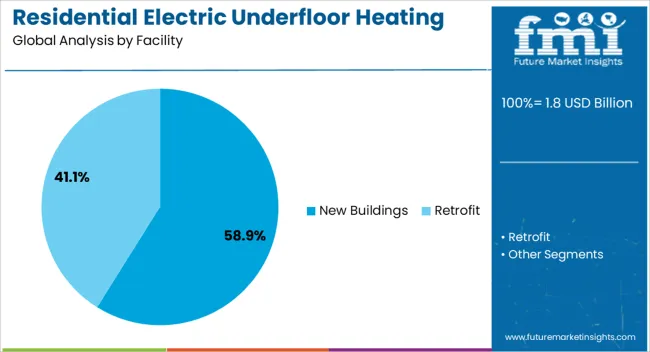
The new buildings facility segment is projected to hold 58.9% of the residential electric underfloor heating market revenue in 2025, making it the leading facility type. This dominance is being attributed to the growing trend of integrating energy-efficient heating systems during initial construction phases, where installation is more cost-effective and less disruptive compared to retrofitting.
Developers and architects are increasingly incorporating electric underfloor heating systems into new residential projects to meet evolving building codes and consumer preferences for comfort-oriented designs. The segment has also benefited from the rising adoption of sustainable construction practices, where such heating systems contribute to lower energy consumption and reduced environmental impact.
The ability to seamlessly integrate these systems into modern flooring materials and layouts without compromising aesthetics has further encouraged adoption. As new housing developments accelerate in urban and suburban areas, demand from this segment is expected to remain strong, supported by favorable regulations and buyer interest in advanced home heating solutions.
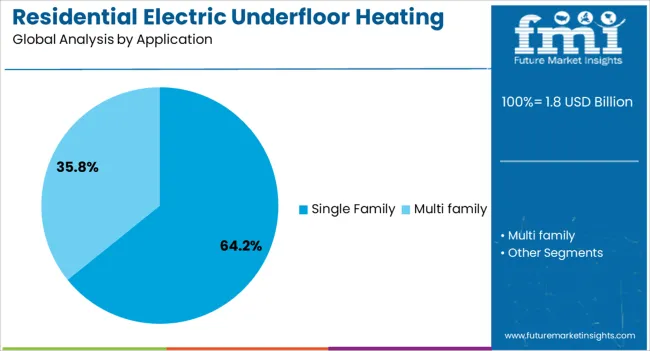
The single family application segment is anticipated to account for 64.2% of the market revenue in 2025, positioning it as the dominant application category. This leadership is being driven by increasing adoption among homeowners seeking personalized comfort, improved heating efficiency, and reduced reliance on traditional radiators or duct-based systems.
Single family homes often have larger floor areas and diverse room configurations, making electric underfloor heating an attractive solution for evenly distributed warmth throughout the property. The growing emphasis on smart home integration and the availability of programmable heating controls have enhanced convenience, enabling households to manage energy consumption more effectively.
Additionally, the long-term cost savings from reduced maintenance and efficient energy use are encouraging installation in both premium and mid-range residential properties. With rising consumer preference for modern, space-optimizing heating solutions, this segment is expected to maintain its dominance over the forecast period.
The residential electric underfloor heating market is expected to grow steadily, driven by rising demand for energy-efficient heating systems and improved home comfort. Demand is reinforced by increasing home renovations, new builds, and the shift toward more cost-effective, space-saving solutions. Opportunities are emerging in smart home integration, DIY installation kits, and high-performance systems. Trends emphasize self-regulating cables, thin heating mats, and compatibility with various floor coverings. However, challenges such as high upfront costs, installation complexities, and limited awareness in some regions continue to affect market growth.
Demand for residential electric underfloor heating has been reinforced by the increasing popularity of home renovations, where homeowners seek more efficient and aesthetically pleasing heating solutions. Underfloor heating systems offer a space-saving alternative to traditional radiators, allowing for better interior design flexibility. Demand is also growing in newly built homes, where underfloor heating is integrated into modern energy-efficient designs. The appeal of consistent, invisible warmth without the need for bulky heaters is driving adoption, especially in colder regions where home comfort is a priority. As energy costs rise, homeowners are looking for long-term solutions that provide comfort without compromising efficiency, making electric underfloor heating an increasingly attractive option.
Opportunities in the residential electric underfloor heating market are being shaped by the integration of smart home systems and the rise of DIY installation kits. Smart thermostats and app-based control systems are gaining popularity, allowing homeowners to manage heating remotely and optimize energy usage. Convenience of DIY installation kits is opening new growth avenues, especially in markets where professional installation costs are seen as prohibitive. Moreover, as new builds and renovations embrace home automation, opportunities for electric underfloor heating systems that integrate seamlessly into broader smart home ecosystems are expanding. These trends reflect the market’s shift toward greater convenience, efficiency, and cost savings in home heating.
Trends in the residential electric underfloor heating market emphasize the development of highly efficient systems and compact designs. Self-regulating cables, which adjust heat output based on floor temperature, are becoming popular for their ability to enhance efficiency and reduce energy consumption. Thin heating mats are gaining traction, as they are easier to install in existing floors, making retrofitting more feasible. Compatibility with various floor coverings, such as tiles, wood, and carpet, is becoming a key factor in product development. These trends reflect a market shifting toward more versatile, efficient, and user-friendly heating solutions that align with modern home design and energy-saving priorities.
Challenges in the residential electric underfloor heating market stem from high upfront costs, installation complexities, and limited awareness. While the long-term savings and comfort are significant, the initial investment required for electric underfloor heating systems remains a barrier, especially in price-sensitive regions. Professional installation can add to the cost, limiting adoption in some households. In certain regions, awareness of the benefits and feasibility of underfloor heating remains low, particularly among homeowners who have not yet considered alternatives to traditional heating systems. These challenges suggest that while the market has strong growth potential, wider adoption will require cost reductions, improved education, and more accessible installation options.
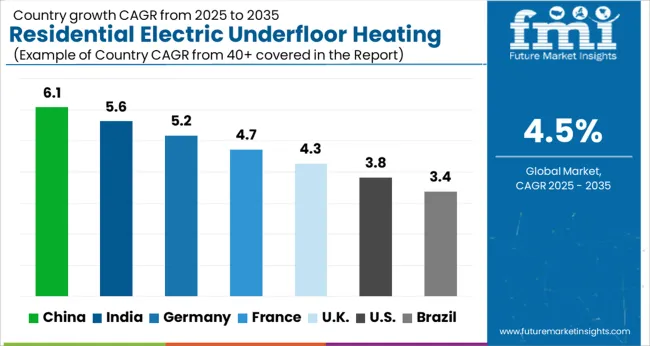
| Country | CAGR |
|---|---|
| China | 6.1% |
| India | 5.6% |
| Germany | 5.2% |
| France | 4.7% |
| UK | 4.3% |
| USA | 3.8% |
| Brazil | 3.4% |
The global residential electric underfloor heating market is projected to grow at a CAGR of 4.5% between 2025 and 2035. China leads at 6.1%, followed by India at 5.6% and France at 4.7%. The United Kingdom is forecast at 4.3%, while the United States records 3.8%. Growth is driven by rising demand for energy efficient home heating solutions, increasing adoption in residential renovations, and government support for sustainable energy solutions. Asian markets are growing faster due to the expanding middle class, urbanization, and construction activities. Europe sees steady adoption, driven by an emphasis on energy efficiency, while the USA reflects slower growth, influenced by the availability of alternative heating solutions and the preference for HVAC systems. This report includes insights on 40+ countries; the top markets are shown here for reference.
The residential electric underfloor heating market in China is projected to expand at a CAGR of 6.1%. Growth is supported by rapid urbanization, rising disposable incomes, and increasing consumer preference for energy-efficient heating solutions in homes and apartments. As China continues to expand its middle class, demand for residential heating systems, including underfloor heating, is rising, particularly in newer residential buildings. The government’s focus on reducing energy consumption and improving indoor air quality drives adoption of electric underfloor heating, which is more efficient and cleaner compared to traditional heating methods. Domestic manufacturers are scaling production to meet the growing demand in urban and suburban regions.
The residential electric underfloor heating market in India is expected to grow at a CAGR of 5.6%. The increasing demand for modern heating solutions in urban areas, particularly in high-end residential projects, supports growth. India’s rising middle class, along with higher standards of living, drives the adoption of energy-efficient solutions such as underfloor heating. Additionally, the growing popularity of sustainable construction practices and government incentives for energy-saving home products boost market expansion. While the adoption is currently concentrated in affluent urban areas, continued urban development and rising awareness of energy efficiency will expand the market in the coming years.
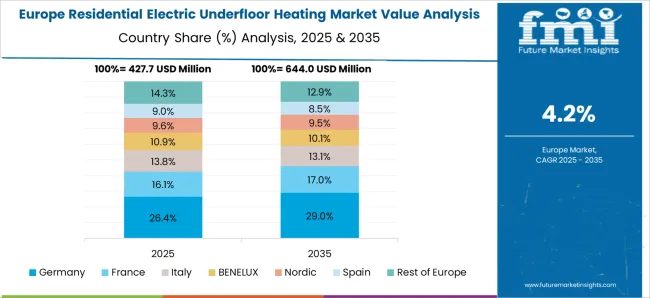
The residential electric underfloor heating market in France is projected to grow at a CAGR of 4.7%. Growth is driven by consumer demand for environmentally friendly, energy-efficient heating solutions, particularly in new residential developments and renovation projects. France’s commitment to reducing energy consumption and improving sustainability in housing supports the adoption of electric underfloor heating systems. Additionally, the increasing demand for smart home technologies and advanced heating systems to ensure comfort and energy savings reinforces the trend. France’s regulatory framework, which incentivizes the use of low-carbon heating technologies, contributes to the steady demand for underfloor heating systems.
The residential electric underfloor heating market in the UK is forecast to grow at a CAGR of 4.3%. The market expansion is supported by increasing consumer awareness of energy-efficient heating solutions, government incentives for green building projects, and a growing preference for underfloor heating in new residential builds. With the UK’s commitment to net-zero carbon emissions by 2050, demand for low-energy, environmentally friendly heating solutions is increasing. Furthermore, the popularity of underfloor heating systems, particularly in high-end residential projects, is contributing to the market’s steady growth. Despite moderate growth compared to other regions, the UK remains an important market in Europe for energy-efficient home heating.
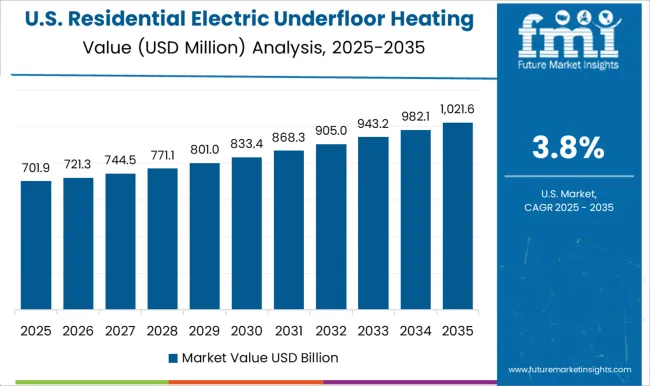
The residential electric underfloor heating market in the US is projected to grow at a CAGR of 3.8%. Growth is slower compared to Asia and Europe, but steady demand is driven by consumer interest in energy efficiency, comfort, and smart home integration. The increasing popularity of renewable energy solutions, such as solar, combined with energy-efficient heating options, supports the adoption of underfloor heating. While HVAC systems remain dominant, underfloor heating is gaining traction in energy-conscious households, especially in states with colder climates and higher demand for heating. As consumers seek more sustainable and cost-effective home heating solutions, the USA market will continue to see moderate, but consistent growth.
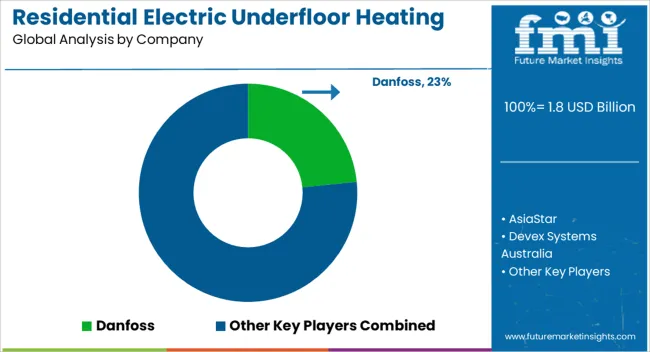
The residential electric underfloor heating market is highly competitive, driven by growing consumer demand for energy-efficient and comfortable home heating solutions. Competition is shaped by heating system type (cable, mat, or film), installation flexibility, energy efficiency, safety features, pricing, and brand reputation. Companies differentiate through smart thermostats, IoT-enabled controls, rapid heating technologies, and eco-friendly solutions that reduce energy consumption and enhance convenience.
Key players such as Warmup, Devi (Danfoss), Uponor, Schluter Systems, Raychem, ThermoSoft, Nexans, Flexel, HeatTech, and Fenix Group dominate the market by offering innovative, reliable, and easy-to-install underfloor heating systems. Strategic partnerships with construction companies, e-commerce platforms, and home improvement retailers are commonly used to expand market reach. Regional and niche players compete by providing cost-effective, customizable, and energy-efficient solutions tailored to local climate conditions and building codes. The market remains moderately fragmented, with leading brands emphasizing product innovation, smart controls, and long-term reliability to capture residential demand, strengthen market share, and position themselves as trusted providers in the evolving home heating sector.
| Item | Value |
|---|---|
| Quantitative Units | USD 1.8 Billion |
| Facility | New Buildings and Retrofit |
| Application | Single Family and Multi family |
| Regions Covered | North America, Europe, Asia-Pacific, Latin America, Middle East & Africa |
| Country Covered | United States, Canada, Germany, France, United Kingdom, China, Japan, India, Brazil, South Africa |
| Key Companies Profiled | Danfoss, AsiaStar, Devex Systems Australia, Elektra UK, Ezewarm Ireland, Gold Heat, Heat Mat, Hemstedt, Magnum Heating, Mysa Smart Thermostats, nVent, OJ Electronics, Schluter-Systems, SunTouch, ThermoSoft, Uponor, and Warmup |
| Additional Attributes | Dollar sales by system type (cable, mat, foil, mesh), Dollar sales by application (bathrooms, living rooms, kitchens, bedrooms), Trends in smart thermostats and energy-efficient systems, Role in improving indoor comfort and reducing heating costs, Growth driven by home renovation projects and green building trends, Regional demand across North America, Europe, Asia Pacific. |
The global residential electric underfloor heating market is estimated to be valued at USD 1.8 billion in 2025.
The market size for the residential electric underfloor heating market is projected to reach USD 2.8 billion by 2035.
The residential electric underfloor heating market is expected to grow at a 4.5% CAGR between 2025 and 2035.
The key product types in residential electric underfloor heating market are new buildings and retrofit.
In terms of application, single family segment to command 64.2% share in the residential electric underfloor heating market in 2025.






Full Research Suite comprises of:
Market outlook & trends analysis
Interviews & case studies
Strategic recommendations
Vendor profiles & capabilities analysis
5-year forecasts
8 regions and 60+ country-level data splits
Market segment data splits
12 months of continuous data updates
DELIVERED AS:
PDF EXCEL ONLINE
Residential Generator Market Size and Share Forecast Outlook 2025 to 2035
Residential Energy-Efficient Technologies Market Size and Share Forecast Outlook 2025 to 2035
Residential Interior Wood Doors Market Size and Share Forecast Outlook 2025 to 2035
Residential Air-to-Air Heat Pump Market Size and Share Forecast Outlook 2025 to 2035
Residential Automatic Motor Starter Market Size and Share Forecast Outlook 2025 to 2035
Residential AMI Gas Meter Market Size and Share Forecast Outlook 2025 to 2035
Residential Vacuum Circuit Breaker Market Size and Share Forecast Outlook 2025 to 2035
Residential Solar Tracker Market Size and Share Forecast Outlook 2025 to 2035
Residential Carpet Roll Market Size and Share Forecast Outlook 2025 to 2035
Residential Air Insulated Power Distribution Component Market Size and Share Forecast Outlook 2025 to 2035
Residential Energy Efficient Windows Market Size and Share Forecast Outlook 2025 to 2035
Residential Solar Energy Storage Market Size and Share Forecast Outlook 2025 to 2035
Residential Solar PV Inverter Market Size and Share Forecast Outlook 2025 to 2035
Residential Water Treatment Devices Market Size and Share Forecast Outlook 2025 to 2035
Residential Air to Water Heat Pump Market Size and Share Forecast Outlook 2025 to 2035
Residential Heat Pump Market Size and Share Forecast Outlook 2025 to 2035
Residential Smart Gas Meter Market Size and Share Forecast Outlook 2025 to 2035
Residential Energy as a Service (EaaS) Market Size and Share Forecast Outlook 2025 to 2035
Residential Solar Generator Market Size and Share Forecast Outlook 2025 to 2035
Residential Voltage Regulator Market Size and Share Forecast Outlook 2025 to 2035

Thank you!
You will receive an email from our Business Development Manager. Please be sure to check your SPAM/JUNK folder too.
Chat With
MaRIA